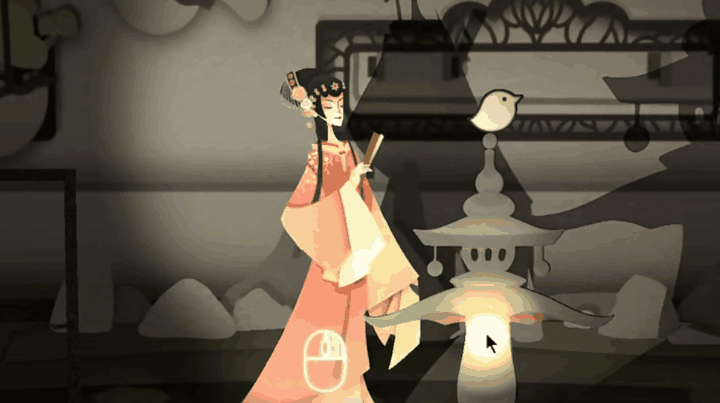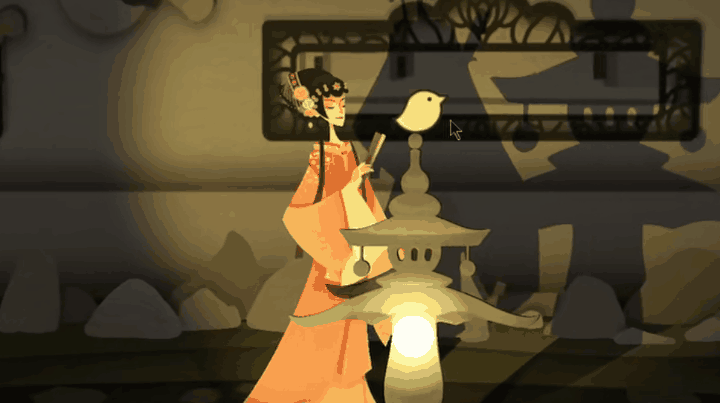
Intro
Netease 2021 MiniGame
Theme: "Drama"
Genre: 2D narrative storytelling game
Engine: Unity
Date: 2021.10
My Role: Game Designer, Technical Artist
Inspiration
I watched a touching YouTube video of former ballerina Marta González, who has Alzheimer's disease but could still recall and act the dance moves. I want to create a game based on this story to evoke empathy for people with Alzheimer's.


"The Father" by Florian Zeller inspired me a lot since it tells the story from the perspective of a patient who suffers from Alzheimer's disease.
According to the research of National Center for Geriatrics and Gerontology, coloring practicthe e can help improve cognition of Alzheimer's patients, So we have added the mechanism of coloring props with spotlight in the game.
Based on our cultural background, I led the team to create this interactive storytelling about Kunqu, a traditional Chinese Opera, in which the performers interpret love stories through dance and poetic songs.

Game Concept
An aging Kunqu ( a type of traditional Chinese opera) actress named Yun (云, means “Cloud”) suffers from Alzheimer’s disease and is confined to a wheelchair. She hears a recording of her youthful debut and enters that memory of the stage, the spotlight, and the love story.
DOWNLOAD: https://ruzhang-zhao.itch.io/memory-in-kunqus-shadow
Gameplay Design
1.Basic Gameplay









2.Character Design






Level Design
Jenova Chen's Emotional Intensity Curve
We designed 7 scenes and arranged them based on the Emotional Intensity Curve used by Jenova Chen in "Journey." Firstly, in 1990, Yun dreamed about her fantastic premiere as a young Kunqu actress in 1947, where she met her lover on the stage.
However, they separated in both the story of the play and reality. Then, she woke up. Alzheimer's disease had damaged her memory and made her stuck in a wheelchair.
Eventually, the distant memory revived, with which she step into the heaven.



1.Night Garden


2.Under the Blossom Tree
3.Moon River


4. Wake from History
Technology Detail
Shadow Play Style Animation
I used 2D Skeletal Animation System of Unity to create a Chinese shadow puppet play style animation for the game. This system allows me to make bones and rig the different parts of the character from multilayered artwork.

In order to make the character animation both shadow play and Kunqu style, I spent a lot of time studying the dance movement of the shadow puppets and Kunqu actress to make keyframes.


Team
Jiming Zhang
Programmer, Technical Artist
-
Created the main gameplay based on Unity
-
Produced the interactable objects of the Levels
-
Developed the UI system
-
Developed the 2D lighting shader script
-
Developed the sound system in the game
Zhanyi Huang
Programmer, Technical Artist
-
Created the main gameplay based on Unity
-
Produced the interactable objects of the Levels
-
Created the scene lighting
Yilan Peng
2D Artist
-
Drawed the young actress character sprite based on Kunqu Opera customs
-
Created the scene props of the "Night Garden" and "Under the Blossom Tree" Levels
Xueming Hou
2D Artist
-
Created the scene props of the "Night Garden" and "Under the Blossom Tree" Levels
-
Drawed the elderly actress character sprite based on Kunqu Opera customs
Man Mei
2D Artist
-
Created the scene props of the "Moon River" and "Wake up from Dream" Levels
-
Drawed the UI icon resources
Yutong Li
Game Designer
-
Designed the basic gameplay and design documentations
-
Created the developement needs list
-
Edited the game trailer
-
Tested the game and created the feedback documentation
Jiarui Zhang
Sound Designer
-
Designed and produced the sound effect of our game using traditional Chinese instrument sound source
Ruzhang Zhao
Game Designer
-
Designed the basic gameplay, interactions and storyboards
-
Designed the levels based on Jenova Chen's Emotional Intensity Curve used in Journey
-
Created the 2D skeletal animation using the sprite provided by artists
Prototype
Gameplay & Scene Paper Prototype
To help our artists and programmers to understand the gameplay and layout of our scene. I unpacked a cardboard box and used one side as the stage floor and the side perpendicular to it as the stage background.
Then, I made paper models of figures and arches and glued them at different depths. The flash with a roll of tape in front of it became my "spotlight."
My teammates really like this idea since they could get the idea smoothly from this mini theatre model.
